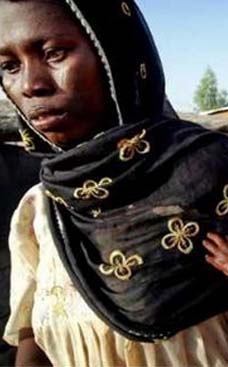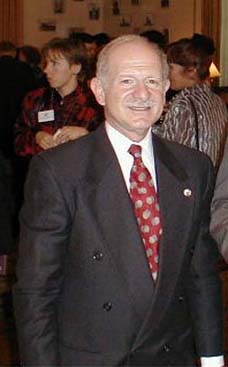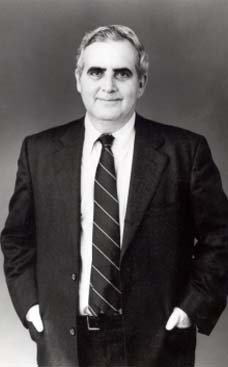June 20, 2005: Headlines: COS - Tonga: Crime: Murder: Justice: Law: Psychiatry: PCOL Exclusive: American Taboo: A Peace Corps Tragedy
Peace Corps Online:
Directory:
Tonga:
Special Report: 'American Taboo: A Murder in the Peace Corps':
February 9, 2005: Index: PCOL Exclusive: Murder of PCV Deborah Gardner (Tonga) :
June 20, 2005: Headlines: COS - Tonga: Crime: Murder: Justice: Law: Psychiatry: PCOL Exclusive: American Taboo: A Peace Corps Tragedy
 | American Taboo: A Peace Corps Tragedy
Returned Volunteers met with author Philip Weiss in Baltimore on June 18 to discuss the murder of Peace Corps Volunteer Deborah Gardner. Weiss was a member of a panel that included three psychiatrists and a criminal attorney. Meanwhile, the Seattle U.S. Attorney's office announced that Dennis Priven cannot be retried for the murder. "We do not believe this case can be prosecuted by anyone, not only us, but in any other jurisdiction in the United States." Read background on the case here. |
American Taboo: A Peace Corps Tragedy
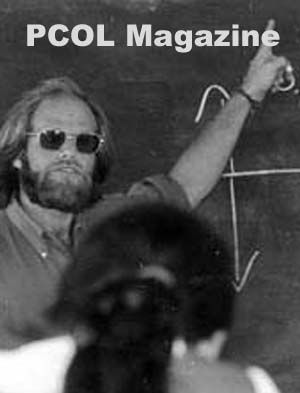
American Taboo: A Peace Corps Tragedy
American Taboo: A Peace Corps Tragedy
by Philip Weiss, Author of American Taboo
Caption: Dennis Priven (above) was tried for the murder of Peace Corps Volunteer Deborah Gardner in Tonga in 1976 but was acquitted by reason of insanity.
When Hugh Pickens, President of the Maryland Returned Volunteers, gave me directions over the phone to his house in Baltimore he also said something no former Peace Corps volunteer has said in the year since my book about a murder in the Peace Corps came out: "This guy was one of ours and he has gotten away with it," he said. "The Peace Corps community should deal with this."
I found this a bracing attitude. The Peace Corps community has generally regarded the 1976 murder of Volunteer Deborah Gardner and the successful effort by Peace Corps to free the volunteer who killed her, Dennis Priven, as a sensational curiosity. Yes, many of them have expressed pity for Gardner and bemoaned the injustice in the case. But as the Peace Corps administration in Washington continues a 29-year pattern of stonewalling the facts, saying it knows nothing and cannot investigate, it has had the tacit support of the Peace Corps community. No one has said, "Something should be done about this."
I got to Pickens’ stone Victorian in the Druid Hill Park section of Baltimore at 1 pm on Saturday June 18. Soon there were a dozen or so former volunteers milling about the food table, when I heard a typical snatch of Peace Corps conversation.
"You know why I travel third class," a lady was saying.
"No why?" said her friend.
"Because there’s no fourth."
I was immediately drawn to the speaker, a stylish slender lady of about 70, wearing orange espadrilles and a skirt to match. She introduced herself as Lane and we started talking. Though she appeared to level off at 5’ 2", she might as well have been 7’ 2", there was such strength of character in her large blue eyes and steel gray hair. She told me she had lately served as a volunteer in South Africa and she was headed back to Africa the next day, on a trip to Egypt that she had promised a niece or granddaughter. For six weeks, no less. Lane was looking forward to the souks and the buses.
We all made our way to the living room and for the next four hours talked about the murder case. Hugh played a copy of a CBS "48 Hours Investigates" documentary on the case that had aired in October last year and again this June, and people got out copies of my book. I saw that some had made careful notes on the pages. Hugh had gone to the trouble of assembling three psychiatrists and a criminal attorney to discuss the case. All had studied the case. Two of the head-doctors were going to take opposing sides for purposes of the discussion.
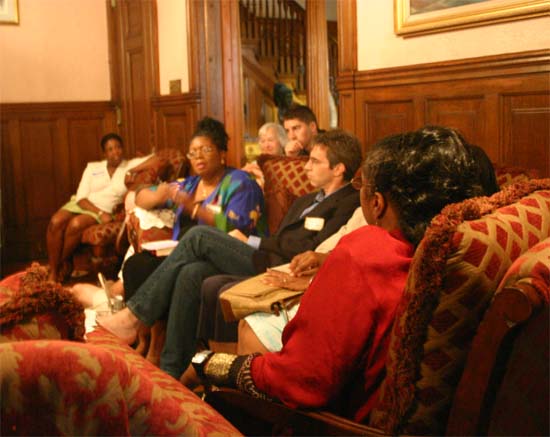
Psychiatrist Marilyn Martin (center) makes a point while (left to right) Charma Rhoden, Joseph Permetti, Brian Dulay, Philip Weiss, James Crockett, Linda Robinson, and Sunday June Pickens listen.
The debate surrounded the mind of Dennis Priven. Priven was freed on an insanity defense in 1976, the first insanity defense in the history of Tonga, a defense mounted at great expense by the American government. The State Department and Peace Corps had united on the goal of getting Priven out of Tonga in a hurry so as to end an international incident before it gained any real attention - as would have occurred had the burly volunteer been hanged on that remote and dusty Polynesian island. In the process, Peace Corps had trashed Deborah Gardner’s reputation and brought in a psychiatrist from Hawai to assert that Priven was a full blown psychotic, a paranoid schizophrenic.
On the other side was the Tongan government. It didn’t care how many guys Gardner had dated and did not believe that Priven was mentally ill under the law. But the Tongans were overmatched by the Americans. There was no psychiatrist in the entire Kingdom, and the government couldn’t afford to bring one in. Priven was soon back in the States, where our government promised he would be hospitalized. He didn’t want to be hospitalized, and had walked away.
The experts’ bottom line was emphatic, and expressed in sober tones by one of the psychiatrists, who rose to speak, wearing a suit (most of us had on shorts or flipflops). Priven was not a psychotic, as claimed; there was little evidence at all to show this. Delusions had not interfered with his working as a teacher or his friendships. He was probably suffering from a narcissistic personality disorder, which manifests itself as obsessive involvement with one’s own interests and lack of empathy for others.
Had he been charged in any American court, he would have gone "down the river-or up the river, as the case may be," he said.
After that the discussion focused on the Peace Corps and State Department who had sought to keep the case quiet (I pointed to a few mid-level officials). And why? The case had taken place three weeks before the 1976 election, and Peace Corps waited till Election Day to announce the news; publicity would have hurt the agency, and raised questions about inadequate screening of volunteers and the appointment of incompetent country directors for political purposes.
Hugh expressed the belief that a case like this could never happen today. Country Directors haven’t been political appointees since Director Loret Ruppe Miller corrected this problem in the 1980's he said and there is more concern now for volunteers who are victims of crime. And the media would soon descend on any island, no matter how distant to tell the truth as they have lately on Aruba, in the case of the Alabama teenager who went missing on vacation. The main element in the Priven case – that it had taken place out of sight - would be removed in today’s world. The Peace Corps would be compelled to act more like the Peace Corps.
And while Hugh thanked me for unearthing the story - "It needed to be told" - he doubted that there would be any further follow through from Peace Corps. The agency is not alone, by the way, in its indifference. While the congressman representing Deborah Gardner’s home district, of Tacoma, Washington, has called for the case to be reopened, and the Gardner family, which only learned Priven had gone free from me, 25 years after the fact, has pushed for Priven’s prosecution, the U.S. Attorney in Seattle has lately concluded (on the basis of what investigation it is not clear) that nothing can be done to prosecute Priven.
The discussion was dying down when Lane opened her mouth. She was, as I expected, compelling.
In Samoa, she said, they knew how to handle a case like this. The young man would be dropped on the porch of his victim’s parents’ house, and made to stay there by a 24-hour police watch. It was up to the victim’s family to feed him - or not - or talk to him - or not. If they chose to murder him, that was their business. But what usually happened, she said, was that the young man ended up dedicating his life to making up for his act. And the family learned to forgive the young man. In this way, both victim and criminal were offered a way to live new lives after the horror.
A good solution, I said. And what was notable about the Priven case was that the Gardner family had been deprived of all power. They were misinformed about the character of their daughter’s death, they were never encouraged to go to Tonga (and her divorced parents did not go), they were misled about the insanity defense, and, neither parent was involved in the negotiations that brought about Priven’s departure from the island nor told when he had gone free in Washington. They thought he was being hospitalized under an international agreement. They had to learn the truth from me, in 2001. Deb’s father’s response to the recent decision not to reopen the case: "So I have to stomp my own snakes?"
Lane agreed that the matter was a great injustice, but said, "Now what is to be done."
Then she told us a story. Some years ago she had lent a "sensational" antiquity to a small museum. She had planned to return the object before long to the country from which it had come. But then the museum had gone and sold the thing, without consulting her. A complete foulup.
And what was she to do, she said. She could have sued the museum, but she recognized that if she did so it would ruin the small museum. She had elected to keep her mouth shut.
In the Deb Gardner case, she concluded, it may be the right thing to investigate the Peace Corps, to call in those responsible and try to get answers. But the process might destroy Peace Corps. Therefore, leave it alone.
This has been the attitude of the Peace Corps community from the start. Indifference rationalized by the sense of the nobility of their mission. The erasure of Deborah Gardner’s humanity - now she is reduced to the status of an inanimate artifact.
The Peace Corps community has been afraid for nearly 30 years that an open treatment of this matter would be so explosive as to somehow to destroy the agency. Who knows - it may only make Peace Corps service more glamorous and intriguing. But then, no one in Peace Corps will ever test that possibility. So the coverup continues.
Peace Corps Online presents award to Philip Weiss
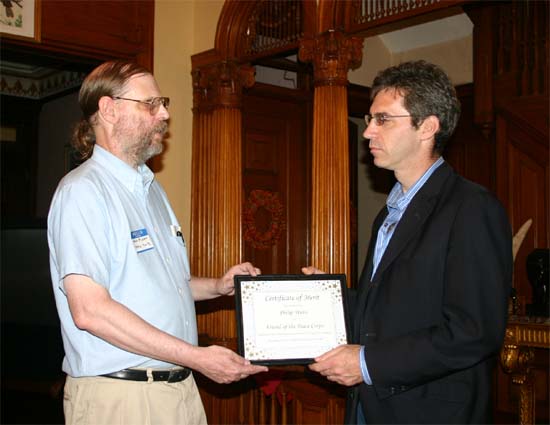
Hugh Pickens (left), Publisher and co-editor of Peace Corps Online, presents a certificate to Philip Weiss thanking him for his service to the Returned Volunteer community. Pickens stated upon presenting the award: "It doesn't make the Peace Corps stronger to hide the truth. The Peace Corps becomes stronger when the truth is told. Part of our duty as Returned Volunteers is to make sure that the agency recognizes its mistakes, corrects them, and learns from them. We are the Peace Corps - all of us - and it is our responsibility to make sure that tragedies like this never happen again. We thank you for your service to the Returned Volunteer community."
When this story was posted in July 2005, this was on the front page of PCOL:





Peace Corps Online The Independent News Forum serving Returned Peace Corps Volunteers
 | The Peace Corps Library
Peace Corps Online is proud to announce that the Peace Corps Library is now available online. With over 30,000 index entries in 500 categories, this is the largest collection of Peace Corps related stories in the world. From Acting to Zucchini, you can find hundreds of stories about what RPCVs with your same interests or from your Country of Service are doing today. If you have a web site, support the "Peace Corps Library" and link to it today. |
 | American Taboo: A Peace Corps Tragedy
Returned Volunteers met with author Philip Weiss in Baltimore on June 18 to discuss the murder of Peace Corps Volunteer Deborah Gardner. Weiss was a member of a panel that included three psychiatrists and a criminal attorney. Meanwhile, the Seattle U.S. Attorney's office announced that Dennis Priven cannot be retried for the murder. "We do not believe this case can be prosecuted by anyone, not only us, but in any other jurisdiction in the United States." Read background on the case here. |
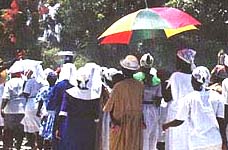 | June 14: Peace Corps suspends Haiti program
After Uzbekistan, the Peace Corps has announced the suspension of a second program this month - this time in Haiti. Background: The suspension comes after a US Embassy warning, a request from Tom Lantos' office, and the program suspension last year. For the record: PCOL supports Peace Corps' decision to suspend the two programs and commends the agency for the efficient way PCVs were evacuated safely. Our only concern now is with the placement of evacuated PCVs and the support they receive after interrupted service. |
 | Friends of the Peace Corps 170,000 strong
170,000 is a very special number for the RPCV community - it's the number of Volunteers who have served in the Peace Corps since 1961. It's also a number that is very special to us because March is the first month since our founding in January, 2001 that our readership has exceeded 170,000. And while we know that not everyone who comes to this site is an RPCV, they are all "Friends of the Peace Corps." Thanks everybody for making PCOL your source of news for the Returned Volunteer community. |
Read the stories and leave your comments.

Some postings on Peace Corps Online are provided to the individual members of this group without permission of the copyright owner for the non-profit purposes of criticism, comment, education, scholarship, and research under the "Fair Use" provisions of U.S. Government copyright laws and they may not be distributed further without permission of the copyright owner. Peace Corps Online does not vouch for the accuracy of the content of the postings, which is the sole responsibility of the copyright holder.
Story Source: PCOL Exclusive
This story has been posted in the following forums: : Headlines; COS - Tonga; Crime; Murder; Justice; Law; Psychiatry
PCOL21233
29
|
By RPCV (ca1462-ch01-bl04.ma-cambridg0.sa.earthlink.net - 207.69.137.203) on Tuesday, June 21, 2005 - 8:00 am: Edit Post |
Phillip thanks for the book:
Here is what was quoted above:
But as the Peace Corps administration in Washington continues a 29-year pattern of stonewalling the facts, saying it knows nothing and cannot investigate, it has had the tacit support of the Peace Corps community. No one has said, "Something should be done about this."
Reaction : Yes, the culture of cover up is the same in this case as it is in most safety cases like the 2,700 Plus who have been victims of violence. Lebensoln should be investigated as well as every Doctor or Nurse who has worked with him or given him the authority to work on a Peace Corps volunteer. THERE I HAVE SAID. I am not afraid or intimidated to do so. Many volunteers and former volunteers are because of their jobs and so called positions. They let these injustices slide by in the name of development.
The Peace Corps community is wrong on these safety issues. They have even lobbied Congress to shoot down the Ombudsman's office because they want to continue the cover up in these cases and cases to come. The IG is not the place for this investigation. He is not independent. His job relies on the Director to extend his service. Chris Shays likes him and the government reform committee won't budge because Shay's wants these cases covered up.
"This guy was one of ours and he has gotten away with it," he said. "The Peace Corps community should deal with this."
The Peace Corps would be compelled to act more like the Peace Corps.
Peace Corps needs a Conflict Resolution center for iteself. Because, how can you resolve conflict outside when you can't resolve your own within the Peace Corps community.
I'd like to steer some discussion back to the featured article and the murder case of Deb Gardner, if possible. First, I'll echo a big thanks to Philip Weiss for his relentless research into the matter that resulted in American Taboo, and another big thanks to Hugh Pickens for giving this case the press it deserves in PC-Online. Second, I'd like to reiterate that this case is not so much about exposing or protecting the PC organization, as it is about long-overdue justice for the Gardner family. What concerns me is that the justice they deserve has been withheld for much of the past 29 years due to efforts to "protect" the Peace Corps, in much the same way that justice for Deb was forsaken initially due to the PC's misguided efforts to "protect" Dennis Priven. The PC and US gov't should have let Tongan justice be served in 1976 if they couldn't honor their word to the Tongans that Mr. Priven would suffer American justice. But since neither has happened, the Gardner family goes on grieving, and the only prison that confines Dennis Priven is the one of his own making. That thought is probably the only justice that sustains many of us today who still grieve for Deb and the brutal way she died... the thought that if he has no remorse, Dennis Priven will someday take those bloody memories to his grave and deal with it there. And then there'll be justice.
|
By Anonymous (pcp0010733601pcs.howard01.md.comcast.net - 69.243.79.17) on Friday, July 08, 2005 - 10:53 am: Edit Post |
Peace Corps volunteers need to encourage our Director to write a letter of apology to Debra's family. It is never too late.
|
By R Allen Lee (pc021851.dsc.unomaha.edu - 137.48.19.222) on Thursday, July 21, 2005 - 2:42 pm: Edit Post |
If at all possible the assaulter of Deb Gardner
should be prosecuted. I find it quite painful
that the Peace Corps allowed this injustice to
Debra and her family. Perhaps an investigation
of the Peace Corps is also needed. Lets obtain
justice for Debra and her family. I almost
joined the Peace Corps myself in the 70's, now
I would not recommend it to anyone.
The story of Deborah Gardner's murder, and its subsequent U.S. government sanctioned cover-up, is one of the most egregious mis-carriages of justice that I have ever read about. This makes me sick to my stomach. I cry for the victim and her family, and I pray that Mr.Priven, and all those instrumental in his escape from justice, pay fully in this life or the next for their crimes. This whole foul smelling affair is just what I have come to expect from my government. Deborah Gardner, as an American citizen, and as a human being, deserved, and had a right to expect better, from her country.










